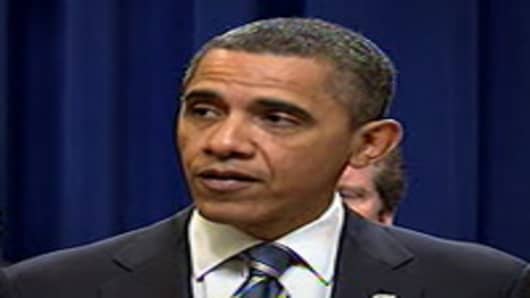While President Obama may not be Wall Street's ideal candidate, stock prices are rising on growing expectations he will be re-elected this November.
Part of that, market pros say, is simply that investors feel more certain about who will be in the White House for the next four years and which policies they will have to deal with.
Obama's chances of winning in November increased to above 60 percent on Tuesday, up from about 50 percent at the beginning of the year, according to the odds on prediction market Intrade.com.
Meanwhile, the S&P 500 has hit a new bull market high and is up 9 percent on the year.
The stock market’s rise comes as the supposed Republican frontrunner, Mitt Romney, continues to contend with Rick Santorum in an effort to win the GOP nomination. Romney won primary battles in Michigan and Arizona on Tuesday.
The surge in President Obama’s chances at a second term also have coincided with a string of better-than-expected domestic economic datathis year, including an all-important drop in the unemployment rate.
The latest reading of U.S. consumer confidenceon Tuesday blew away economists’ expectations. That contrasts with the Republican debates, many of which have centered on social issues.
“The Romney, Santorum, and Gingrich infighting has done irreparable harm to the Republican Party’s ability to present an alternative economic platform to voters,” says Joe Terranova, chief market strategist for Virtus Investment Partners. “As long as manufacturing and other key data continues to improve, the market is growing comfortable with Obama being President again.”
History shows the market tends to rise during election years. Gains tend to be even greater if the incumbent party wins.
To be sure, not everyone is buying the old adage that the “market hates uncertainty.” Some feel it is still way too early to predict what will happen in November and that Obama’s policies will be harmful to business, causing a sell-off in 2013 if he is re-elected.
“As to penciling in Obama, while the market likes certainty, certainty of bad news will not be good for the market,” said Stephen Weiss of Short Hills Capital. “Although the effect of an Obama second term will be muted if economy continues to improve.”
Weiss and others can at least take heart with the Congressional odds.
Intrade puts the Republicans’ chances of controlling the Senate and House after the November elections at 72 percent and 64 percent respectively.
That brings up another Wall Street maxim: “Market likes gridlock.” This way, a single party can’t mess it up.
----------------------------------------------------------------------
DO YOU KNOW?: Why are optimistic investors called bulls?
Click here and find outin the latest installment of our Wall Street History series.
----------------------------------------------------------------------
For the best market insight, catch 'Fast Money' each night at 5pm ET, and the ‘Halftime Report’ each afternoon at 12:00 ET on CNBC. Follow @CNBCMelloy on Twitter.
______________________________________________________
Got something to say? Send us an e-mail at fastmoney-web@cnbc.com and your comment might be posted on the Rapid Recap! If you'd prefer to make a comment, but not have it published on our Web site, send your message to fastmoney@cnbc.com.



